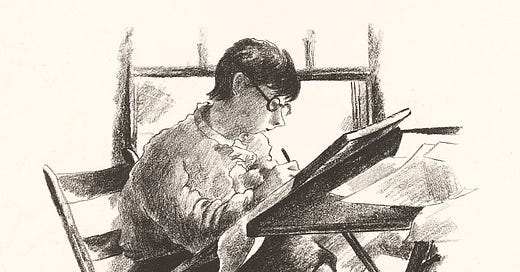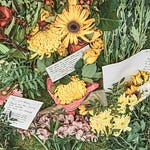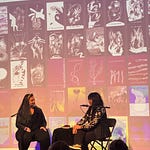This is Five and Nine, a podcast newsletter at the intersection of magic, work and economic justice. Welcome to Season 1, Episode 6, Part 2. We have one more episode to go this season, and we are pleased to share we are now available on Apple Podcasts.
Listen to the podcast now, or read the transcript below, or both!

Resources
Music and Words
Rum tum tiddle, composed by Jean Schwartz, lyrics by Edward Madden and sung by Al Jolson in 1911
Tarot Cards
Eight of Cups
Five of Swords
Two of Pentacles
The Hermit
Transcript
Ana: This is a special edition at Five and Nine. We wanted to hear Dear Abby-style discussions about work and career. And this is part two of a two part episode where we respond to guest queries with a live tarot reading and conversation. In part one, we discussed the Gate, Lock and Key spread that we're using, and we talk a little bit about the purpose of readings to get the full experience. Be sure to listen to part one of this episode at thisisfiveanine.com.
Dear Five and Nine,
I am a writer and trying to work on a big project that I often feel overwhelmed by. And in the face of looming deadlines, I find myself staying in the overwhelm and anxiety spirals or research rabbit holes instead of just doing the next little granular thing, for example, even just creating a messy draft of a tiny chunk of text.
This is probably so common as to be cliché, and it's not exactly that I feel blocked or stuck. It's just hard to get the actual small step done that would ease all the rest. I'd be grateful for any advice or insight.
Signed
Too Often Distracted.
Cany of you relate to this? Any writers here?
Xiaowei: Ah, that’s like every day of my life.
Ana: Yes.
Xiaowei: Oh, so real.
Ana: This is a tough one. I think any big project — it's really that feeling of overwhelm that causes so much anxiety.
Xiaowei: I deeply to like the depths of my soul resonate with your question, Too Often Distracted. I will say something that my therapist has often been like, well, in these instances, what do you feel like you're avoiding? She asked me that, and I'm just like, wow, why are you such a good therapist?
Ana: I received a great piece of advice early on in my book writing, which is that you have to project manage yourself because no one else is going to do that for you.
In an office environment, so often there's a project manager, and there's the person doing the production. There's someone who's keeping everyone on task, and there's the people doing the tasks. When you're an author, especially if you're working alone, you're both of those people.
One thing that I do, when working on a big project, is I turn on project management brain. And then I turn on writer brain, but those brains are not the same person. They're not the same time of day. They're not even the same day of week. And in most workplaces, those are often two different people.
Dorothy: I think one of the things that surprisingly has been effective for me — this isn't effective for everyone — is having an accountability buddy. Or people that you know that you're going to meet with, whether it's a writing group, whether we're going to send each other text messages.
I used to do that, actually, when I was working on my master's thesis. One of my really good friends, Emily K. Holmes, who's also a writer, would actually text me in the morning of a day that she knew that she had to meet a certain word count, like, “Okay. I promised myself that I would write a thousand words by Friday. Could you text me on Thursday and just ask how's it going with that piece?” Very informal. And it actually was effective for both of us, but you know, you, it doesn't work for everyone.
Sometimes the small things don't feel like they add up and that's something we actually need to be reminded of constantly. People don't see all the behind the scenes stuff, all the quiet work, all of the ways that you have met a deadline or freaked out and wrote 2000 words, scrapped 1500 of those 2000. Nobody sees that.
And I think when we think of all of those things put together, the actual small steps, they themselves become equally daunting to the big task at hand. And I'm saying that from experience where I am oftentimes scared to write out my to-do list. So I have to make separate to do lists because I need to compartmentalize my life that way.
Xiaowei: You know, I've been thinking about this recently, especially because we live in a culture that has so emphasis on productivity. Oftentimes we give ourselves such a hard time about our inability to do something.
And I'll just put it out there: writing a book that is a huge project. It is hard and it is scary and — I don't know if this is true for you, Too Often Distracted, but when I write short pieces that I'm like, oh, if I don't like how it turned out, it's on the internet. It's short, it's fine. It kind of falls away from memory. A book feels like a different ball game.
So I think maybe also think about what is that emotional response that is weighing in.
Ana: You kind of pointed to that, Xiaowei. A book just has so much weight, literally. It'll be cataloged with the Library of Congress. It goes into libraries. People keep it on their bookshelves. That's a big thing.
Dorothy: Okay. But wait a second. Listen. So yes, I agree, Xiaowei and Ana, that there's weight to it, but it's also a marker of time. Like, I don’t want anyone to feel that they are beholden to being the thing that they wrote because you change and evolve.
Too Often Distracted, I hope that you remember that. I think it's because you care, that's why this matters to you so much, but I think that also what can be stifling is the block or the stuckness comes from that understanding that this is a project that matters so deeply to you. And at the end of the day, yes, there’s weight, and yes, there's gravity to it, but you're also ever evolving.
[7:44] A Reading for Too Often Distracted
Ana: Should we do a reading?
Dorothy: And it's, only fair that Too Often Distracted also gets two keys.

Ana: Okay. The gate. The gates that I've drawn for you, Too Often Distracted, is the Nine of Pentacles. It's a feminine figure wearing a beautiful dress, a golden dress, and has a falcon in their arm. On their hand, they have a glove that's holding a bird , and around them is a beautiful garden with nine pentacles, or coins, distributed throughout.
Many people interpret the figure as pensive or as joyful. It's often seen as a figure that is looking at their successes, the things they've done, and admiring it.

Xiaowei: For the lock, I drew the Knight of Swords, and it depicts someone who is on a gray horse, holding a sword. And there's a lot of energy, just like intellectual force, that’s rushing into the frame. Actually, in the position of being next to the Nine of Pentacles, it's almost like Nine of Pentacles, it's like a pensive, flowy garden vibe, and the Knight of Swords is kind of rushing in with the sword wielded at the Nine of Pentacles.
Dorothy: Ooh, these cards. Okay. So here, let's pick two keys then. Yeah. Okay. That's some big sword energy right there. So let's see, what's the big key energy here?

Oh, so your first key, Too Often Distracted, is the Hierophant. And then your second is, jeez, it's a Ten of Swords.

So the description here for the Hierophant in the Gorgon’s Tarot — it's a round deck. So it is a feminine figure, actually, that has their left hand raised, pointing to the sky. It’s two fingers, often very Catholic, but I see it as pointing towards the heavens. And then in the right hand, folded over the body is pointing a sword down, and we see a fish, a very symmetrical card in that there are fish at the bottom of The Hierophant and skulls, and the backdrop is that of a garden. And we see two moons behind them as well. And then there are keys actually on two pillars. I should say that that's very important since it's two keys.
And then the Ten of Swords is a figure in the foreground. The body is facing down, and the arms are in a very vulnerable position over the head like that of resignation, like the posturing as the resignation, and instead of the swords being in the body, the swords surround the body, and r the background is that of a night sky. And it almost seems that there are these very abstract shapes that kind of look like flowing leaves in the sky. There's a strong light that's coming through.
Those are the visual descriptors for the Ten of Swords and The Hierophant for the Gorgon’s Tarot.
Ana: I can't tell you how many times, when working on a book, I feel like the Ten of Swords is just like my life.
Xiaowei: I literally texted Dorothy yesterday: “I had a terrible day of writing. Bury me.” Which I think is a good summary of the Ten of Swords. Bury me.
Dorothy: Oh, my gosh. I mean, it's funny, I really love, Xiaowei, your visual description for the Knight of Swords was really apropos, that there's this kind of intellectual force that is just like charging ahead. It’s this figure that’s just like all systems go.
And what is interesting is it shows up in the lock position, Too Often Distracted. I feel that this is the energy that you're trying to summon. You're wanting to conjure this intellectual force. I know it's in me. I've done this before. I've done this so many times, maybe not in this particular form or format, but enough so that it can be a catalyst for this big project, but because it is so gargantuan, perhaps in your mind, you're just like, Oh, how do I just get on the horse? What horse also? Well, what armor do I need? It's just that, instead of embodying that energy, we're thinking about all of the accoutrements and what's the right outfit instead of charging ahead. And that takes energy and time, but I really loved that description, Xiaowei.
Ana: And it's so interesting it’s in the blocker position. There's a big difference between writing an article, even a well-written thoughtfully researched article, and a book. An article is so often on deadline, you have to really embody that Knight of Swords energy. It's like a sprint.
A book is a marathon. It just is. And when you're running that marathon, you have to accept that you're going to get those cramps, your legs are going to hurt, it's going to be hot, there’s going to be bugs.
It's going to be a lot of swords, a lot of Ten of Swords. So you just have to be present with those, be mindful of those. What is it that you're turning away from? What is it that you're ignoring? Sometimes we have to allow for that pain to exist, to be okay with it, because that's what makes for a powerful book.
But it looks different because it's not the kind of hard charging energy of a tight article. It's actually longer and meditative and takes just that much more time to produce.
And I see that in dialogue with The Hierophant. I was talking with someone who's facing blockers with their book. They're just getting started in the research phase. As we were talking, I was like, this book is a spiritual project for you. It's not just intellectual. It's not just emotional. This is something deep. And when I talk to most authors, most of the act of wanting to write a book, because it's so hard, is often coming from a really deep place for you. And you don't have to express all of that in the book, but sitting with that and kind of accessing that, what is the bigger story you want to tell?
What is the calling that has brought you to this book in a spiritual sense — whatever spirituality means for you, you can be atheist but serious spiritual. And then again, it looks just so different from that hard charting energy of the Knight of Swords.
Xiaowei: Absolutely. And I love that you pulled in The Hierophant, Ana, because you know, I think that the two that the Hierophant is pointing to it's like one, which is the worldly knowledge, right. The stuff that's like, oh yeah, if we just know more, if we just continue to research more, there's that kind of knowledge.
And then the other form pointing above, there's that spiritual knowledge or that creative part of your soul that's just like this needs to exist in the world. This book needs to exist. It's almost like posting the mission statement in a very visible place for yourself, where it's like, I am writing this book because… just like two sentences or an object or something that is just going to anchor you so that when you see that thing in your office or field of vision that you're reminded and you're kind of grounded and pulled back down to be like, is this piece of research, this rabbit hole that I'm starting to feel myself go down — is it actually part of this anchor? And so, yeah, exactly what Ana said. I think for every author, it is very spiritual.
Dorothy: It's funny because I think in Casandra Snow’s Queering the Tarot, the way that they write about The Hierophant and its difficult relationship for many queer people that actually associate The Hierophant with patriarchy. And I think the way that we're reading The Hierophant is very different because as Jessica Dore reminds us, it's also about benediction.
Helen Tseng and I were talking about that, and how they really appreciated that observation of The Hierophant as being one of what you brought up, Xiaowei. What is the anchor? How are you devoted to this project? What need does it fill, but most importantly, what need does it fill in your life?
And I think with the Ten of Swords, a lot of people freak out when they see the Ten of Swords, but it is completion. It's a type of acknowledgement that there's an epiphany that's happening, and there's this intellectual journey that's occurred for that epiphany or those epiiphanies to come to the forefront, to be top of mind.
And I actually see the keys being maybe what helps us think about getting the small steps done. So going back to the practical, going back to the pragmatic, what would it be like to give yourself that homework of, okay, I'm going to revisit why I'm doing this big project. That's all on the wall. We put painter's tape, so it sticks on the wall. It's not falling down, you can even frame that thing. Whatever gets you to remember on a daily basis or on a weekly basis, why this project is very important to you, but then also understanding that there's milestones that you probably want to meet on a daily, weekly, monthly basis.
Who's also going to help with that? I just really want to overemphasize that, especially in the times that we are living in. Because being a writer is such a challenging, tough job. It really is that you are alone in that endeavor.
There are people in your circle. in your ecosystem, that probably want to help you. And that's okay to ask for that. It doesn't have to be big, and it could be small, such as a text to check in, or it could be as big as what I mentioned, having a small writing group of two or more.
Xiaowei: I think everyone writes differently. I think being generous with yourself about that as well. I was reading this great interview, I forget where, with the writer R.O. Kwon. And something that R.O. Kwon said really resonated with me where, you know, she was saying for them writing is this very solitary activity that has a lot of ritual, which reminded me of The Hierophant. She has like the one cup that she can only use if she's writing. The one shawl.
For me, I struggle. When I'm writing I'm in my own world and I feel totally different than my day to day life person, where everything's a mess and I'm like, smoking cigarettes and just have all these emotions and I have my ritual and I have my special things, which I am totally not like in my day to day.
Ana: It's such a beautiful kind of encapsulation of the spirit of the Nine of Pentacles and being generous, celebrating, recognizing what an incredible accomplishment it is as a writer to get to this stage where you're working on a book. And maybe that's a place to start, with that generosity.
Dorothy: The thing I wanted to add about the Nine of Pentacles is I learned something interesting about falconry on a research trip. And that is, it takes a lot of trust for the falcon, or the bird, to actually come back to you on command. Birds fly, for goodness sake. They don't have to come back to a human, especially a human. If I was a bird, I would not come back.
But I mentioned this because on the Knight of Pentacles, the figure has learned how to command the bird. And the reason why the falcon is hooded is because the hood changes the perception of the bird’s distinction between night and day. So when the bird is hooded, it just automatically believes, oh, it's night. And so you can't do that unless you have built the trust of the falcon.
So when you think of the Nine of Pentacles, you actually have so many resources at your disposal. You have a command that no one else does, and it's only you that can really speak to what you're doing in this big project, in the way that you are doing it.
[22:08] Reading the Cards
Ana: And just a reminder is that in tarot, this is not a prescription. These are not predictions. These are just insights and ultimately we have free will. You all know your context so much more than we do.
These are just perspectives that we hope to share just to challenge thinking, bring perspectives to our audience, but ultimately these decisions that have needed to be made are ones that you make. And we wish you the best, and we thank you so much for your queries.
Dorothy: But that's what tarot it. It's this friend that doesn't have to say much. But it's also not prescriptive. It's never going to tell you what to do. It kind of allows you to see that you have the answers inside yourself.
I almost feel like I'm saying everything and nothing at all, but that's the best way to describe interpretation, like reading generously and also reading from a place that is for the highest good in your life.
Xiaowei: I many ways, tarot is like a good therapist. You know that moment when you're talking to your therapist, and you just kind of see the slight eyebrow raise.
And your therapist is like, So you're telling me that you want X. But you've been doing Y, and Y seems very…going in the opposite direction of X. How do you feel about that And I feel like tarot is just that.
Ana: We have just one more episode before we close out, Season One of Five and Nine, and go on our summer break. Thanks to our audience for listening to this pilot season. Our closing episode, Episode Seven will feature Kai Stowers, a mindfulness practitioner and integral coach who will talk to us about diversity, equity and inclusion, navigating career in a time of change, and leading us in a guided meditation.
Subscribe now and be sure to tell your friends to visit thisisfiveandnine.com.
🎙️ Listen to the Five and Nine Podcast
Subscribe now to get our podcast, with one more episode to close out Season 1. As a podcast newsletter, Five and Nine brings the conversation to text and sound. All podcasts are fully transcribed to encourage accessibility.
Five and Nine is a podcast newsletter at the intersection of magic, work and economic justice. We publish “moonthly” — a newsletter every new moon 🌚 and podcasts on full moons 🌝 — , and we provide an ongoing critical discussion through readings, reflections and debate. In this new world, we’re all rethinking the meaning of work and justice in our lives. Our lives and livelihoods are more essential than ever in identifying ways forward for society that can be grounded in care, compassion and sustainability.
During our pilot period, every issue of Five and Nine is free, and after the pilot, we’ll publish more regularly, with paid and free options. Learn more about us here.
Directors of Magic. Dorothy R. Santos and Xiaowei R. Wang
Creative Director. Xiaowei R. Wang
Producer. Ana Mina (aka An Xiao)
Subscribe now to get our next newsletter. As a podcast newsletter, Five and Nine brings the conversation to text and sound. All podcasts are fully transcribed to encourage accessibility.











